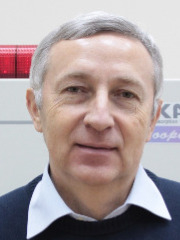Alexander Vladimirovich Soldatov
+7(863) 218-40-00
ext.
11077
+7(863) 219-97-24
Chairman
Southern Federal University
Head of the Scientific Laboratory
Southern Federal University
Scientific supervisor of the research field
Southern Federal University

Research interests:
Nanoscale local atomic, electronic and magnetic structures of advanced smart materials for nano-, bio-, medical applications.
Synchrotron radiation spectroscopies and x-ray free electron laser experiments.
Multiscale supercomputer modelling in materials science and nanotechnology.
Nano-oncology : Development of optimized synthesis techniques of metal-containing nanoparticles having a pronounced effect on tumor tissue, and integrated technologies for enhancing antitumor resistance mechanisms using nanomaterials and personalized low-intensity systemic effects.
Deep machine learning algorithms (Artificial Intelligence) for the analysis of Big Data, obtained at large-scale research facilities.
Deep machine learning algorithms (Artificial Intelligence) for oncology diagnostics.
Research projects:
Smart nanostructured porous materials computer nanodesign, advanced chemical synthesis and spectral nanodiagnostics.
From NanoDesign upto NanoDiagnostics of smart nanomaterials:“full cycle” laboratory setup.
Colloidal magnetic nanoparticles for personalized theranostics in oncology: advanced in-situ x-ray spectroscopic and x-ray nano-imaging research.
Picometer scalecharacterization of 3D local atomic structure parameters of nanomaterials based on XANES spectroscopy.
Nano-oncology : Development of optimized synthesis techniques of metal-containing nanoparticles having a pronounced effect on tumor tissue, and integrated technologies for enhancing antitumor resistance mechanisms using nanomaterials and personalized low-intensity systemic effects.
Deep machine learning algorithms (Artificial Intelligence) for the analysis of Big Data, obtained at large-scale research facilities.
Deep machine learning algorithms (Artificial Intelligence) for oncology diagnostics.
Teaching:
-
Physics of Nanoclusters
Atomic nanoclusters are among the main objects of nanotechnology. Understanding of their formation rules and connection of atomic and electronic structure with the observed properties is a key staring point for the following design of new advanced nanomaterials.
The course “Physics of Nanoclusters" (10 ECTS) is intended for Master students. It is a part of a Master program “Nanoscale structure of materials“ developed in Southern Federal University (Rostov-on-Don, Russia).
The goal of the course “Physics of nanoclusters" is to give students the comprehensive background in the field of nanoclusters properties connected to quantum size effects as well as introduce main theoretical and modern experimental tools for the study of nanoclusters.
The course covers the following main topics:
• Basic concepts and definitions
• Correlation of atomic and electronic structure with observed physical properties of nanoclusters
• Theoretical methods for the analysis of nanocluster atomic and electronic structure
• Experimental techniques for the study of nanocluster atomic and electronic structure
Program
1. Introduction
Quantum size effect
Atomic structure of nanoclusters
2. Theoretical methods for the analysis of nanocluster atomic and electronic structure
Molecular dynamics
Quantum chemistry approaches
Real space methods
Band structure (k-space) methods
3. Experimental techniques for the study of nanocluster atomic, electronic and magnetic structure
Mass spectroscopy
XPS (UPS) spectroscopy
Electron microscopy (HRTEM, EELS, LEED)
XAFS spectroscopy
XMCD spectroscopy
4. Rare-gas clusters
Synthesis
Bonding and electronic structure
Charged clusters
5. Metal clusters
Synthesis
Structure variation vs size
Metal-insulator transition
Magnetic properties
6. Semiconductor clusters
Synthesis
Carbon clusters
Silicon clusters
Compound clusters
7. Ionic clusters
Synthesis.
Alkali Halide clusters
Metal oxide clusters
Metal chalcogenide clusters
8. Molecular clusters
Synthesis
Water clusters
Solvent ; solute clusters
9. Applications of nanoclusters
Nanoelectronics
Spintronics
Catalysis
Medical drugs
Nanophotonics
Tribology
-
ELECTRONIC STRUCTURE OF MATERIALS AND METHODS FOR THE STUDY
The goal of the course “Electronic structure of materials and methods for the study" is to give students the comprehensive background in the field of electronic structure of solid materials as well as introduce main theoretical and modern experimental tools for the study of materials electronic structure.
The course covers the following main topics:
• Basic concepts of electronic structure
• Main parameters of electronic structure
• Connection of electronic structure with observed physical properties of the materials
• Theoretical methods for the analysis of electronic structure
• Experimental techniques for the study of electronic structure
Program
1. Introduction: Main definitions
2. Electronic Band Structure and physical properties
Electron conductivity
Magnetic properties
Optical properties
Thermoconductivity
3. Theoretical methods for electronic structure analysis
DFT formalism
Band structure theory
KKR formalism
APW methods
Multiple scattering in real space
Finite differences method in real space
4. Spectroscopic techniques
XPS spectroscopy (UPS, ESCA)
XAFS spectroscopy (XANES, NEXAFS, EXAFS)
EELS spectroscopy (ELNES)
XMCD spectroscopy
XES spectroscopy
Optical spectroscopy
NMR spectroscopy
EPR spectroscopy
Mössbauer spectroscopy
Tunneling spectroscopy
Positron annihilation spectroscopy
5. Case studies
Download CV (pdf)



